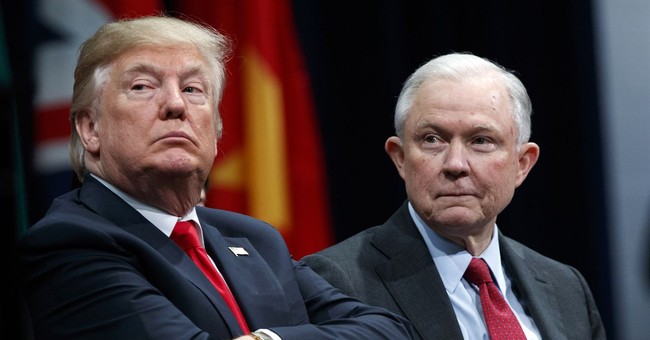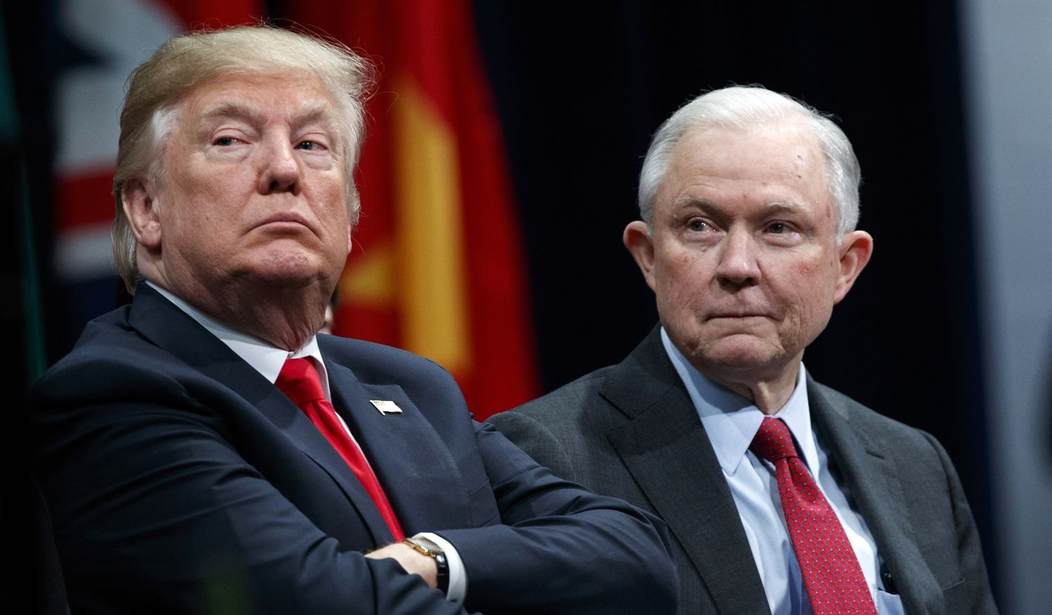
This story is going to engender some serious controversy — I’m confident of that.
There will be many who take the “hard and fast” position that Jeff Sessions had no choice but to recuse himself from all matters involving the Trump-Russia investigation that the FBI was already conducting at the time he was confirmed as Attorney General. Many will point to the language requiring recusal in the regulation as giving Sessions no alternative. The DOJ regulation in question is 28 CFR Sec. 45.2, and it reads:
(a) Unless authorized under paragraph (b) of this section, no employee shall participate in a criminal investigation or prosecution if he has a personal or political relationship with:
(1) Any person or organization substantially involved in the conduct that is the subject of the investigation or prosecution; or
(2) Any person or organization which he knows has a specific and substantial interest that would be directly affected by the outcome of the investigation or prosecution.
(b) An employee assigned to or otherwise participating in a criminal investigation or prosecution who believes that his participation may be prohibited by paragraph (a) of this section shall report the matter and all attendant facts and circumstances to his supervisor at the level of section chief or the equivalent or higher. If the supervisor determines that a personal or political relationship exists between the employee and a person or organization described in paragraph (a) of this section, he shall relieve the employee from participation unless he determines further, in writing, after full consideration of all the facts and circumstances, that:
(1) The relationship will not have the effect of rendering the employee’s service less than fully impartial and professional; and
(2) The employee’s participation would not create an appearance of a conflict of interest likely to affect the public perception of the integrity of the investigation or prosecution.
But the answer to the question is not as obvious as has always been suggested.
What is not clear from the language of the regulation is how it might apply to an Attorney General. To whom would the Attorney General report the potential conflict as contemplated by subparagraph (b)? No one — it was up to the Attorney General to make a judgment with regard to the application of (b) on his own. But to do so, Sessions should have at least made a meaningful inquiry into what the investigation was about, and why his recusal was necessary under the specific circumstances of that investigation.
In July 2017, Andy McCarthy wrote this article in the National Review pointing out that because the Crossfire Hurricane investigation was a counter-intelligence matter at the time of Sessions recusal on March 2, 2017, the regulation set forth above did not require his recusal because the regulation applies only to “criminal investigations.” Even if “criminal investigations” arose out of the counter-intelligence investigation, it would have been incumbent upon Sessions to make recusal decisions on a case-by-case basis, and not in blanket fashion over the entire subject.
But even before reaching that point, because Sessions was the top law enforcement official in the entire federal government, it WAS his responsibility to demand that the FBI explain just what it was they were doing, and how the matters they were pursuing got started. Whether Session had engaged in cocktail party conversations with the Russian Ambassador was completely irrelevant to his responsibility to look “behind the curtain” at the operation being run by FBI officials who were his subordinates and had to answer to him for their decision-making.
What Sessions did instead was cave-in to the NY-DC media establishment and Democrats in Congress caterwauling by acting like a politician and legislator, rather than like the leader and chief law enforcement officer in the new Trump Administration. Would it have been unpopular in the press? Sure it would have. Would he have been denounced by his former Democrat colleagues in the Senate? Sure he would have. Would he have been under fire every day for “exposing” an FBI investigation? Sure he would have.
But that was his job — to ride herd over the law enforcement apparatus of the federal government, including all components of the Department of Justice, and put a stop to any rogue operations. If that meant taking political heat for unpopular decisions — well that’s the job he signed up for.
Sessions’ knee-jerk decision to recuse himself based on “opinions” of career “ethics” officials at DOJ — who all lacked any factual understanding of what the FBI was doing — was an abdication of his responsibilities as Attorney General to see that the laws were being FAITHFULLY enforced.
What he should have done was to call Jim Comey into his office, and ask for a full briefing on what Crossfire Hurricane was about, how it got started, and its current status. That would not involve — at that point — telling the FBI anything about what it should do next. That would have involved only Sessions educating himself about whether there was truly a requirement under the recusal regulation to step aside — and not leave that determination to others who were not the Attorney General of the United States.
If Comey had refused, Sessions should have recommended that Trump fire Comey. Then Sessions could summon Andy McCabe to his office, and put the same questions to him. Repeat the process as necessary until someone in the FBI realized that they actually do have to answer to others in the DOJ for what they are doing in the name of the United States Government.
Jeff Sessions didn’t do his job, and the last 3 years are a direct result of that failure. He was uniquely in a position to have exposed Crossfire Hurricane for the politically inspired hit-job that it was from the start — if he had only had the courage to ask.
Fifty-three former officials connected to the Obama Administration all told the House Intelligence Committee that they never saw any evidence of collusion or coordination between anyone in the Trump campaign and Russia.
It would have been nice if Attorney General Jeff Sessions had seen fit to ask the FBI the same question before deciding to not be Attorney General on the subject.















Join the conversation as a VIP Member